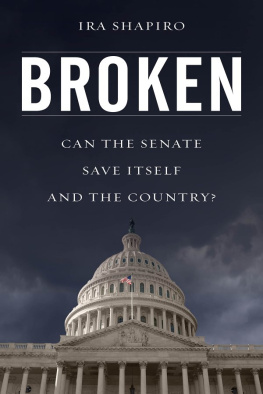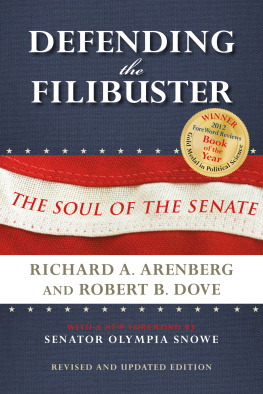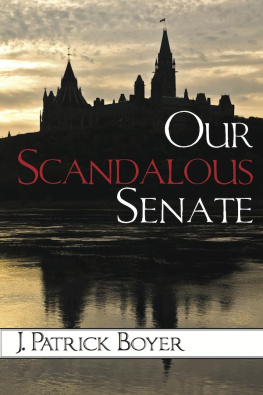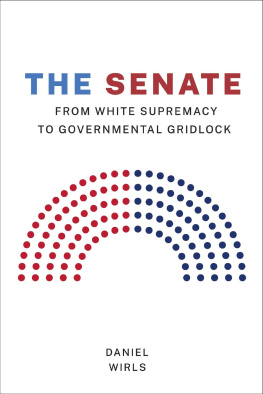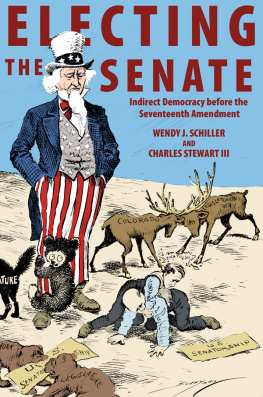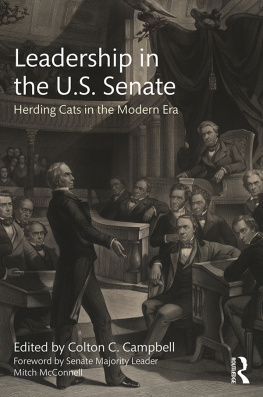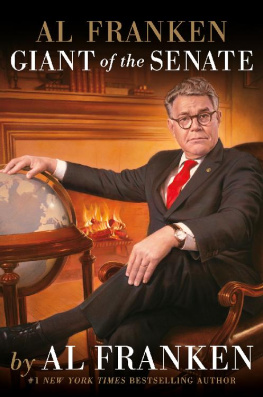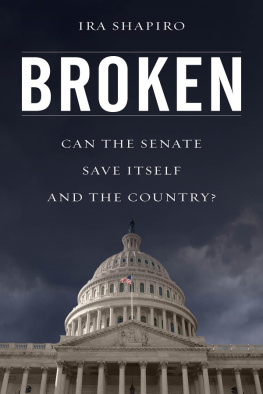Ira S. Shapiro - Broken: can the Senate save itself and the country?
Here you can read online Ira S. Shapiro - Broken: can the Senate save itself and the country? full text of the book (entire story) in english for free. Download pdf and epub, get meaning, cover and reviews about this ebook. year: 2018, publisher: Rowman & Littlefield, genre: Politics. Description of the work, (preface) as well as reviews are available. Best literature library LitArk.com created for fans of good reading and offers a wide selection of genres:
Romance novel
Science fiction
Adventure
Detective
Science
History
Home and family
Prose
Art
Politics
Computer
Non-fiction
Religion
Business
Children
Humor
Choose a favorite category and find really read worthwhile books. Enjoy immersion in the world of imagination, feel the emotions of the characters or learn something new for yourself, make an fascinating discovery.
- Book:Broken: can the Senate save itself and the country?
- Author:
- Publisher:Rowman & Littlefield
- Genre:
- Year:2018
- Rating:4 / 5
- Favourites:Add to favourites
- Your mark:
- 80
- 1
- 2
- 3
- 4
- 5
Broken: can the Senate save itself and the country?: summary, description and annotation
We offer to read an annotation, description, summary or preface (depends on what the author of the book "Broken: can the Senate save itself and the country?" wrote himself). If you haven't found the necessary information about the book — write in the comments, we will try to find it.
Broken: can the Senate save itself and the country? — read online for free the complete book (whole text) full work
Below is the text of the book, divided by pages. System saving the place of the last page read, allows you to conveniently read the book "Broken: can the Senate save itself and the country?" online for free, without having to search again every time where you left off. Put a bookmark, and you can go to the page where you finished reading at any time.
Font size:
Interval:
Bookmark:
Broken
Broken
Can the Senate Save Itself and the Country?
Ira Shapiro
ROWMAN & LITTLEFIELD
Lanham Boulder New York London
Published by Rowman & Littlefield
A wholly owned subsidiary of The Rowman & Littlefield Publishing Group, Inc.
4501 Forbes Boulevard, Suite 200, Lanham, Maryland 20706
www.rowman.com
Unit A, Whitacre Mews, 26-34 Stannary Street, London SE11 4AB
Copyright 2018 by Rowman & Littlefield
All rights reserved . No part of this book may be reproduced in any form or by any electronic or mechanical means, including information storage and retrieval systems, without written permission from the publisher, except by a reviewer who may quote passages in a review.
British Library Cataloguing in Publication Information Available
Library of Congress Cataloging-in-Publication Data Available
978-1-5381-0582-5 (cloth)
978-1-5381-0583-2 (electronic)
 The paper used in this publication meets the minimum requirements of American National Standard for Information SciencesPermanence of Paper for Printed Library Materials, ANSI/NISO Z39.48-1992.
The paper used in this publication meets the minimum requirements of American National Standard for Information SciencesPermanence of Paper for Printed Library Materials, ANSI/NISO Z39.48-1992.
Printed in the United States of America
To my children, Susanna and Brian, and my grandchildren, Zev and Jacob:
our hope for the future.
The Senate, the great anchor of the government... Such an institution may be some times necessary as a defense to the people against their own temporary errors and delusions.
James Madison letter to Thomas Jefferson; Federal Papers #63 (1787)
The American Senate, in my opinion, was the premier spark of brilliance that emerged from the collective intellect of the Constitutions framers.
Senator Robert C. Byrd (1988)
One thing I never heard in my time overseas is I wish we had a Senate like yours.
James Fallows (2010)
Acknowledgments
I t is clich to observe that writing a book is a lonely endeavor. Fortunately, I benefited greatly, as Im sure most authors do, from the encouragement and support of friends and family. I am particularly grateful for the astute comments and suggestions from friends who are terrific students of politics and policy, representing various stages of my life: Brandeis University: Walt and Edie Mossberg, Larry Joseph, and Alan Ehrenhalt; the Senate: Margaret and Al Crenshaw, Brian Conboy, and Ken Ackerman; the Office of the United States Trade Representative (USTR): Jennifer Haverkamp and Vanessa Sciarra; and, more recent friends, who epitomize the talent of the next generation: Joseph Marks, Marta McClellan Ross, and Joe Frederici.
Special thanks go to my administrative assistant, Carmela Lupica (Lena) for her help in all aspects of the book, including research, editing, and production. It greatly helped that Lena was on the Hill almost as long ago as I was, so she found working on the book to be quite absorbing, even when I was somewhat less organized than would have been optimal.
I owe a great debt of gratitude to Jonathan Sisk, vice president and senior acquisitions editor for American government, public policy, and American history, at Rowman & Littlefield. Jon encouraged me to write the book, persuaded Rowman & Littlefield to publish it, and to bring out an updated edition of The Last Great Senate all of which make Jon quite indispensable to this project. Kate Powers, assistant acquisitions editor, has been a constant source of support and help in bringing the book to completion.
In this venture, as in everything in my life for the past half century, my wife, Nancy, was my greatest supporter and my best adviser. Love you!
Introduction
May you have a strong foundation when the winds of changes shift.
Bob Dylan, Forever Young
O n June 25, 2017, as the turbulent Trump presidency passed the five-month mark, the Sunday morning talk shows featured no fewer than ten U.S. senators discussing the presidents firing of FBI director James Comey, its impact on the investigations of Russian interference in the 2016 election and possible collusion by the Trump campaign, and the increasingly heated debate over the future of the Affordable Care Act. It was one of those days that remind us of the central role that senators play in our national political conversation and in the workingor failingof our political system. It was a day when many other Americans shared my interest in, if not my obsession with, the Senate.
I confess to a love of the Senate that goes back more than fifty years. I recall the thrilling summer of 1964 when Hubert Humphrey and Everett Dirksen led the Senate in breaking the southern filibuster to pass the Civil Rights Act; in 1966, J. William Fulbright, wearing sunglasses to shield his eyes for the television lights, convening the hearings that exposed the folly of the escalation of the Vietnam War; in 1968, when Eugene McCarthy and Robert Kennedy stepped forward to prevent President Lyndon Johnson from seeking another term; and in 1973, being part of nation riveted as Sam Ervin and Howard Baker led their select committee in exposing the abuses of power that would become known as Watergate. Long before Lin-Manuel Mirandas Hamilton , the Senate was the room where it happened.
Like Hamilton and Burr in their era, and so many other young people in the crisis times of the 1960s and 1970s, I wanted to be in the room where it happened. I got a job as a summer intern for Jacob Javits, the great senator from New York, and started working in the Senate one day after my graduation from college in 1969. Enthralled by the experience that summerRichard Nixons first year as presidentI focused on coming back to the Senate full time after law school. Gaylord Nelson, the visionary environmentalist from Wisconsin who founded Earth Day, gave me that opportunity, hiring me as his legislative legal counsel.
The Senate I joined in October 1975 had just completed what was probably the most extraordinary decade in its history. In the fall of 1963, the Senate had been virtually paralyzed, hopelessly divided over President Kennedys civil rights legislation, and seemingly unable to make progress on virtually any domestic issues. But with the assassination of Kennedy and the determination of President Lyndon Johnson, the Senate broke the southern filibuster, making possible the passage of the Civil Rights Act of 1964, the greatest legislative accomplishment in our history. The Senate went on from there to play a key role in the range of Great Society legislation, which still forms the foundation of much of American life. After its unwise acquiescence in the Tonkin Gulf Resolution, which Johnson misused as a license to widen Americas involvement in Vietnam, the Senate became the forum for debating and ultimately stopping the war.
In 1973, the Watergate Committee worked, in tandem with the press, the courts, and the special prosecutor, to hold Richard Nixon and his administration accountable for their crimes and their cover-up. In 1975, the Senate empowered a select committee, chaired by Frank Church, to investigate the abuses of the intelligence community. Reacting to the imperial presidency of Johnson and Nixon, the Senate (and the House) reasserted congressional prerogatives, giving themselves powerful new instrumentsthe Budget Act and the War Powers Actfor checking the Executive.
In short, the Senate was in the forefront of every major issue during a decade of crisis in our country. Dealing with civil rights, war and peace, presidential power, and Supreme Court nominations, the Senate seemed to have a special relationship to the Constitution. It occupied a unique role in our country, just as the Founders had intended.
The magnetic pull that the Senate exerted on me was not unique. During this period, the Senate was the place to be, where a young man or woman could come to Washington, hitch their star to a major national figure, make a mark at an early age, and derive priceless experience in politics and government. It was no accident that the staff of the Senate and senators of this era included young men and women who would be future senators and congressional leaders: George Mitchell, Tom Daschle, Lamar Alexander, Mitch McConnell, Susan Collins, Tom Foley, Fred Thompson, Jane Harman, Norm Dicks, Nancy Pelosi, Steny Hoyer, Chris Van Hollen, Ted Kaufman, Angus King; future press and media luminaries: Tim Russert, Chris Matthews, Mark Shields, Lawrence ODonnell, George Will, Jeff Greenfield, Colby King, Steven Pearlstein; future White House chiefs of staff: Leon Panetta, John Podesta, Ken Duberstein, Josh Bolten; a future Secretary of State, Madeleine Albright; two future Supreme Court justices, Stephen Breyer and Elena Kagan; and a future president, Bill Clinton. They trained in the right place. As Justice Oliver Wendell Holmes once wrote about those who had been young during the Civil War: In our youth, to our great good fortune, our hearts were touched with fire.
Next pageFont size:
Interval:
Bookmark:
Similar books «Broken: can the Senate save itself and the country?»
Look at similar books to Broken: can the Senate save itself and the country?. We have selected literature similar in name and meaning in the hope of providing readers with more options to find new, interesting, not yet read works.
Discussion, reviews of the book Broken: can the Senate save itself and the country? and just readers' own opinions. Leave your comments, write what you think about the work, its meaning or the main characters. Specify what exactly you liked and what you didn't like, and why you think so.

